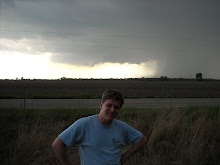As for the 980 mb pressure in the Fitzgerald storm, it was blown away by the pressure in this last storm. This recent storm's lowest pressure reached 954 mb! Remember that 1013 mb is standard atmospheric pressure. The low in this storm was almost 60 mb below standard atmospheric pressure, which is extremely rare in mid-latitude cyclones. Here is a surface map from the Hydrometeorological Prediction Center of this storm at its peak intensity:
 This surface map only shows the pressure at 956 mb, but just a few hours afterwards, this system hit 954 mb.
This surface map only shows the pressure at 956 mb, but just a few hours afterwards, this system hit 954 mb.
Not only did this system hit an astounding low pressure, but it also produced numerous storm reports. At one point, there were tornado warnings extending from Michigan to Alabama, while there was a blizzard in North Dakota, and it was all from the same system. Here are the Storm Prediction Center damage reports over a 3-day period where this system was producing violent weather. Blue marks are damaging wind, green is hail, and red is tornadoes.
The wind damage produced in Illinois on October 25 was mostly overnight into morning. From there, the storm continued producing damaging winds, and it even went on to producing tornadoes.
This storm has mostly moved out of the United States, with just a few remnants of the system remaining. Its pressure has risen back to around 996 mb (not nearly as intense as it was). It is always fascinating how powerful these big historic systems can become. I know I will remember the excitement and awe of watching this storm for a long time.

No comments:
Post a Comment